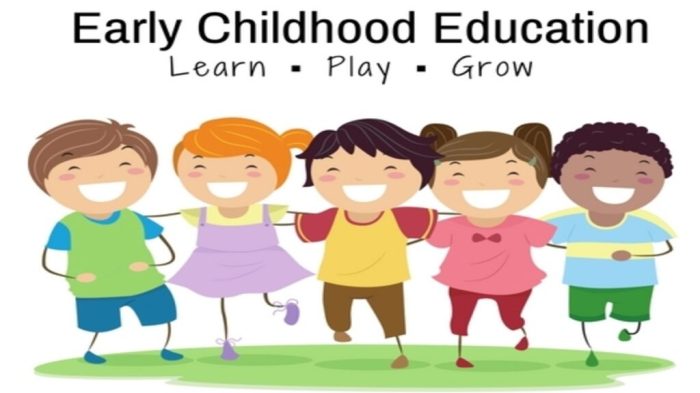With Importance of early childhood education at the forefront, this paragraph opens a window to an amazing start and intrigue, inviting readers to embark on a storytelling idntimes author style filled with unexpected twists and insights.
Early childhood education lays the foundation for a child’s future success, shaping their cognitive abilities, social skills, and overall development in profound ways. Exploring the significance of this crucial stage reveals a world of possibilities and benefits that extend far beyond the classroom.
Importance of Early Childhood Education
Early childhood education plays a vital role in shaping a child’s development and laying the foundation for future learning. It provides a safe and nurturing environment where young children can explore, learn, and grow.
Impact on Cognitive Skills
Early childhood education has a significant impact on a child’s cognitive skills, including problem-solving, critical thinking, and language development. Through interactive activities and play-based learning, children are able to enhance their cognitive abilities in a fun and engaging way.
- Exposure to early literacy activities such as reading and storytelling can help improve language skills and vocabulary.
- Hands-on experiences with puzzles, building blocks, and other educational toys can enhance problem-solving skills and spatial reasoning.
- Engaging in group activities and social interactions can develop communication skills and emotional intelligence.
Long-Term Benefits
Investing in early childhood education not only benefits children in the present but also has long-term positive outcomes for their future.
- Children who receive quality early education are more likely to succeed academically in later years and have higher graduation rates.
- Early childhood education can help reduce the achievement gap among children from different socioeconomic backgrounds, providing a more level playing field.
- Research has shown that children who participate in early education programs are more likely to have better social and emotional skills, leading to improved behavior and mental health outcomes.
Components of Early Childhood Education: Importance Of Early Childhood Education

Early childhood education programs are designed to provide a solid foundation for young learners, focusing on key components that contribute to their holistic development.
Play-Based Learning
Play-based learning is a fundamental component of early childhood education, allowing children to explore, experiment, and create in a hands-on and engaging way. Through play, children develop essential skills such as problem-solving, critical thinking, creativity, and social interaction. It helps in building cognitive, physical, and social-emotional abilities, laying the groundwork for future academic success.
- Encourages creativity and imagination
- Promotes social skills and teamwork
- Enhances language development
- Fosters independence and decision-making
- Develops fine and gross motor skills
Social-Emotional Development
Social-emotional development plays a crucial role in early childhood education as it focuses on nurturing children’s emotional intelligence, empathy, and interpersonal skills. It helps children understand and manage their emotions, build positive relationships, and navigate social situations effectively. Developing strong social-emotional skills early on can lead to better academic performance, improved mental health, and overall well-being.
- Teaches empathy and compassion
- Builds self-confidence and resilience
- Promotes positive behavior and self-regulation
- Enhances communication and conflict resolution skills
- Fosters a sense of belonging and community
Strategies for Effective Early Childhood Education

Effective early childhood education requires a combination of innovative teaching methods, integration of technology, and active parental involvement. Here are some strategies to enhance the learning experience for young children:
Effective Teaching Methods
- Hands-on Learning: Incorporating activities that allow children to explore, experiment, and engage with materials helps them develop cognitive and motor skills.
- Play-based Learning: Utilizing play as a tool for learning not only makes education fun but also enhances social, emotional, and problem-solving skills.
- Differentiated Instruction: Recognizing that each child learns differently and adapting teaching methods to meet individual needs promotes a more inclusive and effective learning environment.
Integration of Technology, Importance of early childhood education
- Interactive Apps and Games: Utilizing educational apps and games can make learning more engaging and interactive for young children.
- Digital Storytelling: Using digital tools to create and share stories can enhance language development and creativity in early learners.
- Virtual Field Trips: Taking children on virtual field trips using technology can broaden their perspectives and expose them to new experiences.
Significance of Parental Involvement
- Home-School Connection: Establishing strong communication between educators and parents helps create a supportive learning environment for children.
- Parent Workshops: Providing parents with resources and information on early childhood development empowers them to be more actively involved in their child’s education.
- Parent Volunteers: Encouraging parents to volunteer in classrooms or participate in school activities fosters a sense of community and collaboration in the educational process.
Challenges and Solutions in Early Childhood Education
Early childhood education faces various challenges that impact the quality of education provided to young children. Identifying these challenges and implementing effective solutions is crucial to ensure that all children have access to high-quality early childhood education.
Common Challenges Faced by Early Childhood Educators
Early childhood educators encounter a range of challenges in their work, including:
- Low wages and lack of professional recognition
- Limited access to resources and materials
- Diversity in student needs and backgrounds
- High student-teacher ratios
Solutions to Address Disparities in Access to Quality Early Childhood Education
To address the disparities in access to quality early childhood education, the following solutions can be implemented:
- Increasing funding for early childhood education programs
- Providing professional development opportunities for educators
- Creating partnerships with community organizations
- Implementing culturally responsive teaching practices
The Importance of Ongoing Professional Development for Early Childhood Educators
Ongoing professional development is crucial for early childhood educators to stay up-to-date with the latest research and best practices in the field. It helps educators improve their teaching skills, stay motivated, and provide high-quality education to young children. Professional development opportunities can include workshops, conferences, online courses, and mentorship programs.